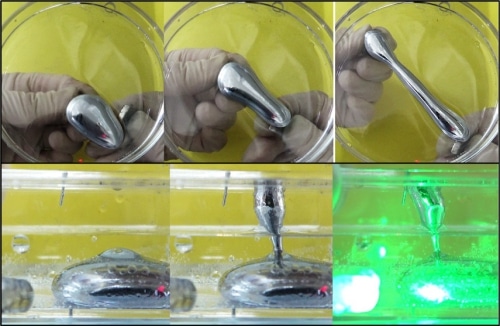May 13 2019
Arnold Schwarzenegger, in the Hollywood film Terminator 2: Judgement Day, became a humanoid liquid metal robot with superpower. Scientists have created a similar quasi-“Terminator” robot in the lab. The study was reported in ACS Applied Materials & Interfaces.
 Magnetic liquid metal droplet. (Image credit: LIU Jing)
Magnetic liquid metal droplet. (Image credit: LIU Jing)
The “Terminator” was developed in the laboratory just recently. A team of researchers headed by Prof. LIU Jing from Technical Institute of Physics and Chemistry (TIPC) of the Chinese Academy of Science and Prof. HU Liang from Beihang University created magnetic liquid metals droplets (MLMD), which can be extended in large scales vertically as well as horizontally in free space at room temperature.
Earlier, liquid metals exhibited exceptional properties that were promising for a soft robot. However, it is not easy to control the liquid metals in a three-dimensional space because of their high density. Several techniques have been employed to manipulate the liquid metal droplets. The droplets typically move as a whole body without maneuvering shape varieties because of their high surface tension.
In this research, gallium and eutectic alloys, iron particles, and electrolytes were used to build the “Terminator.” The gallium oxide layer could envelop the MLMD droplet surface by submerging it in hydrochloric acid.
Consequently, the droplet could be expanded up to approximately four times its original length in three dimensions due to lower surface tension. As the droplet could be expanded at a large scale, it could act as an intelligent electrical connector at free space. It can move horizontally imitating the behavior of upright walking amphibians. The permanent magnets controlled all of the intriguing phenomena.
This system will pave the way for the practical applications of multi-freedom actuation in free space, possibly the intelligent biomimetic soft robot in the future.
This research is supported by the 111 Project and the National Natural Science Foundation of China.